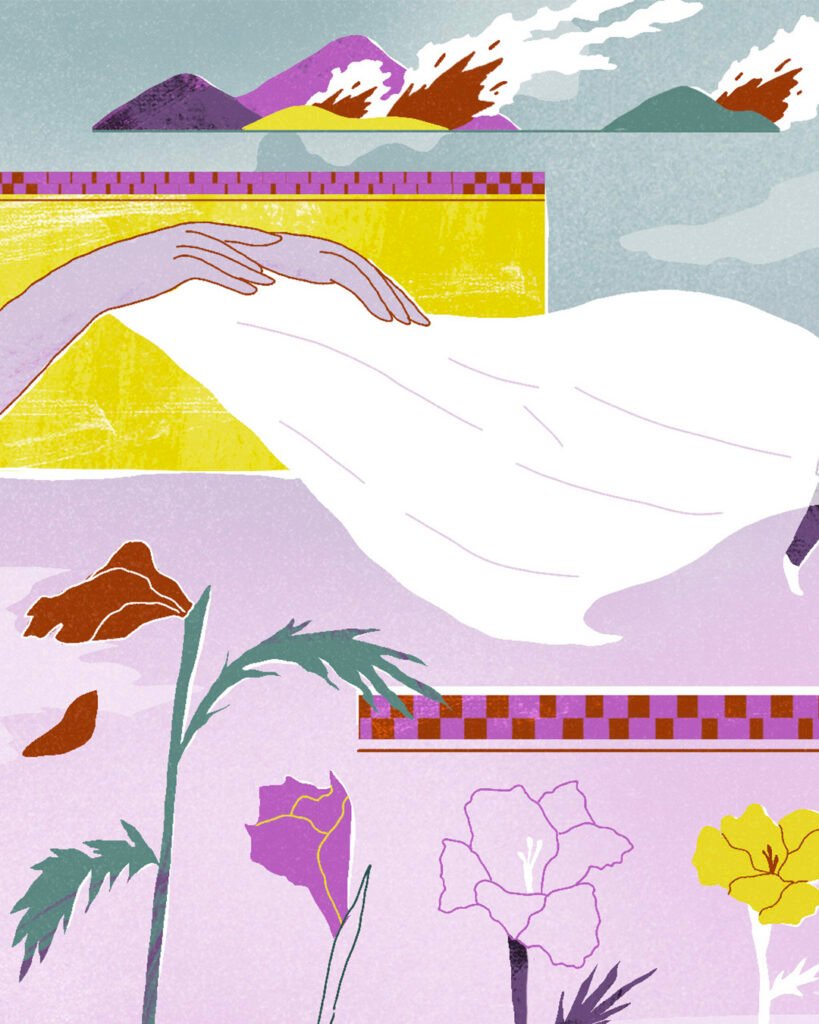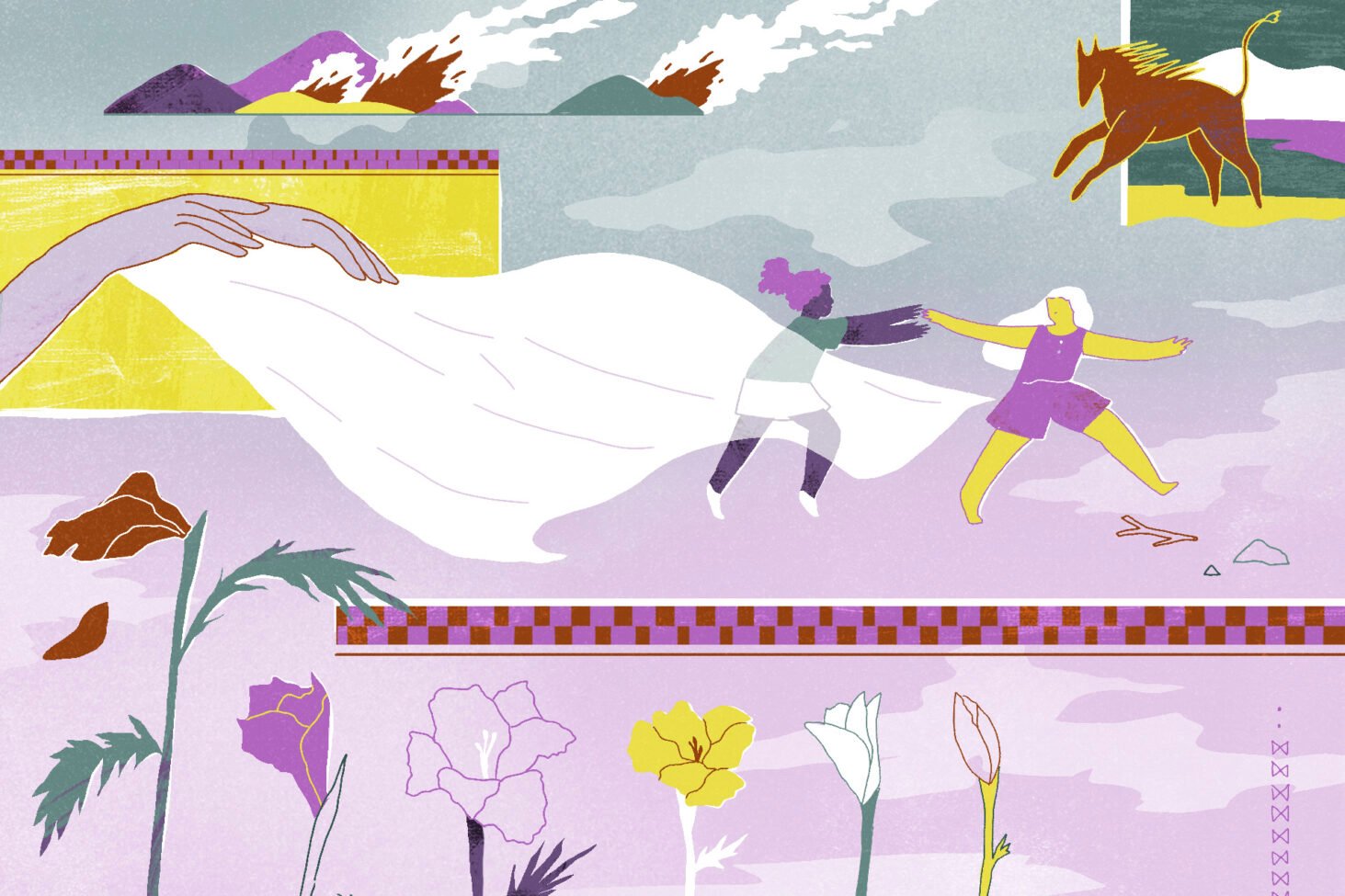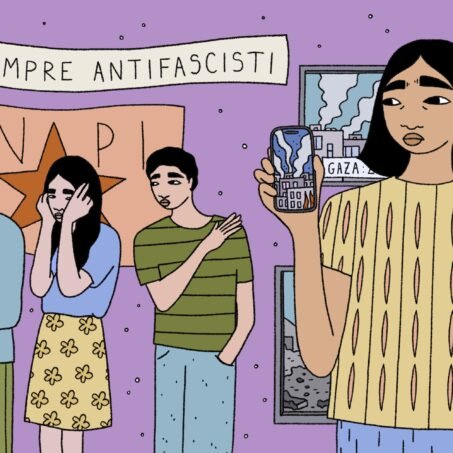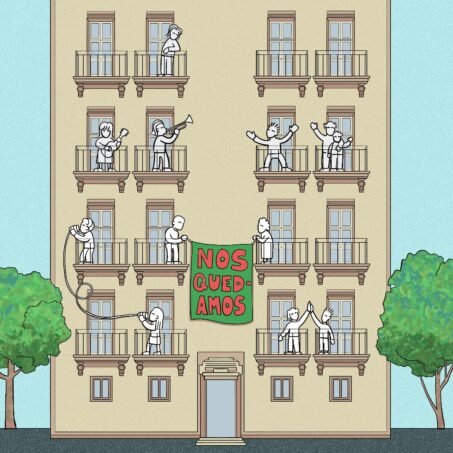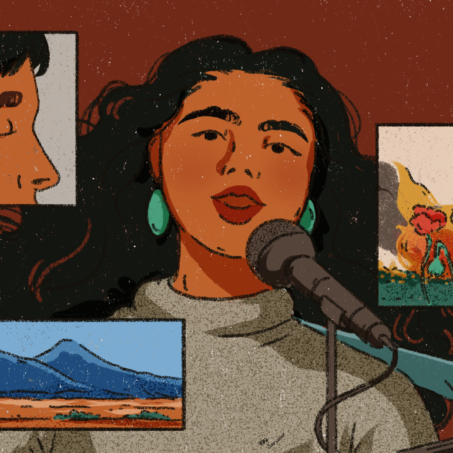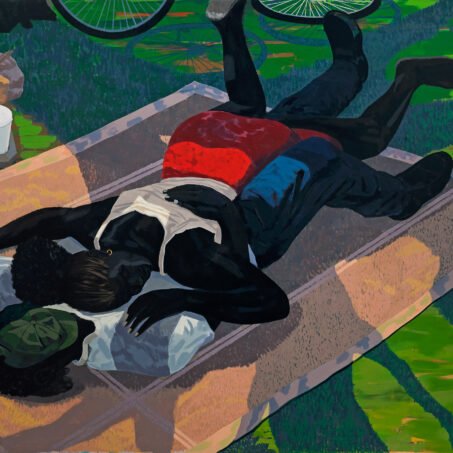Greece is more than a beach-lined, Mediterranean paradise. It is also a country with one of the highest rates of femicides in Europe, overseeing the largest increase (200%) in 2021, with solidified data for the last two years remaining (officially) unknown.
Growing up as a woman in Greece, I began understanding the effects of patriarchal culture from a very young age. Similar to many girls, my first experiences of patriarchy took place in kindergarten. The image of boys chasing me for a kiss in the playground became an embedded memory. Now that I’m older, I’ve not only gained the vocabulary to situate my experiences, but also realised that patriarchy didn’t end in the school playground: it is everywhere.
The symbolism of bed sheets
In response to the rise of femicides in Greece, many artists and activists have been transforming their anger, mourning and frustration into collective resistance. One of them is Georgia Lale, a Greek multidisciplinary visual artist based in New York, who has spent the last four years amplifying and commemorating the voices of femicide victims.
Earlier in April, I had the chance to speak to them directly, and while it was our first conversation, it felt like speaking to a close friend.
Georgia creates artworks from repurposed bed sheets donated from individuals across Greece. While these bedsheets can range in fabrics, colour, size and pattern, Georgia tells me that the materials should meet one requirement: that someone has slept on them while “dreaming of a safe and equal world.”
“I have used the bedsheets of a woman who was murdered by her husband in 2009 in Greece, and the bedsheets that were given to me by her family were the sheets that she made for her children when they were little,” they explained.
I can’t help but think about the warmth that these bedsheets were meant to provide. I envision the woman carefully picking the fabrics and patterns. Could the choices reveal her or her children’s favourite colours? I can hear the sounds of laughter. For a moment, I remember my childhood beddings. They’re not simple materials. They have love stitched into the fabric. Children’s bed sheets should not be a site of controversy: they should only be used as sites of comfort and safety.
After hearing this story, I realised why it felt so familiar speaking to Georgia. We shared a cultural understanding. An understanding that no matter where we are, or who we are with, our lives could be taken away in the very same fabrics that were made to protect us, by the people closest to us.
Georgia encapsulated what I was feeling at this moment. “When a femicide happens, I grieve all these people like they were my family. But making art, speaking about it, and taking a stance on the issue is the only way for me to handle this emotional weight.”
Lola Speak! and the Greek education system
Georgia’s latest exhibition “Lola Speak!” took place in Stavros Niarchos Foundation Cultural Centre this April. It highlighted precisely the extent to which victim-blaming reinforces the dominance of patriarchal norms and gender-based violence. The exhibition consisted of six artworks, made from bedsheets that were donated by femme and female people living in Greece. The artworks all contained visual references to a children’s ABC book that was published by the Greek Ministry Education in 1955.
“I worked with the ABC book because I wanted to point out how important education is when we’re talking about gender-based violence, when we’re talking about gender stereotypes, when we’re talking about consent, when we’re talking about femicides,” they tell me. “This is something that is not being taught in Greek schools at all.”
Georgia’s words made me reflect on my own childhood years in Greece. When I was 14 years old, I remember raising a question during a Biology lesson about the transmission of STIs. My question was immediately dismissed and left unanswered, with my teacher telling me to “stop being so provocative.” The entire class laughed.
There’s a pipeline here – we were not taught how to protect ourselves sexually, and we were also not taught to protect ourselves from sexual violence. As a result, many people of my generation, including myself, sought guidance on digital platforms – something which runs the risk of being exposed to harmful content at a young age, and very often provides misogynist and racist representations of sexuality.

On the day before their actual birthday, Georgia held a performance as part of their exhibition, titled “Birthday.” During the collaborative performance, they recreated the essence of a kids’ birthday party, distributing colouring pages for children and adults alike. They explain that “the idea of the performance was that we deserve to be treated every day like it’s our birthday, and we should not compromise for anything less than that.”
Simultaneously, Georgia asked the participants’ names, and proceeded to sing the traditional Greek birthday song to each of them.“The Greek happy birthday song wishes to grow old, with white hair and radiate wisdom,” they explain. “So in a way, I was wishing the female and femme members of the audience to have a long life and to not be murdered.”
The culture of victim-blaming
Georgia has a very personal reason for creating their art. They tell me that, in the 1930s, their Grandfather’s sister, Maria Lale, was murdered by her husband. “He did it because she refused to sing at the wedding. No one was arrested, because the whole society, the whole community covered up the femicide.”
This complicity is normalised in a patriarchal society. Through time, those in power have failed to acknowledge the state’s control on our bodies, our lives, our existence – instead, there is an insidious culture of victim-blaming. As Georgia says, “Too often you hear the pointed questions: What were you wearing? Why did you stay? Why didn’t you speak up sooner?”
I remember being a young teenager socialising in Athens. Some of my peers had their intimate photos shared publicly, without their consent. I knew that the act was wrong, but I was also a kid who was directly socialised not to blame the perpetrators. I remember assuming it was their fault for taking those photos in the first place. I spent my teenage years distrusting everyone, believing that if I was subject to gender-based abuse, it would be no one’s fault but my own.
Georgia made an important point. “That sort of victim-blaming mentality is not found only in neighbourhoods and families, but it’s also a language used in police stations and courtrooms.”
That sentence really resonated with me. There have been multiple instances where my friends and I have not felt comfortable reporting incidents of sexual harassment and violence. We were more afraid of confiding in Greek law enforcement, than the incidents themselves. Our fear of the police is well-founded. Many of us have been verbally or physically harassed by the police – and generally not taken seriously.

Join our mailing list
Sign up for shado's picks of the week! Dropping in your inbox every Friday, we share news from inside shado + out, plus job listings, event recommendations and actions ✊
Sign up for shado's picks of the week! Dropping in your inbox every Friday, we share news from inside shado + out, plus job listings, event recommendations and actions ✊
This can have lethal consequences. Almost a year ago, on 1st April 2024, Kyriaki Griva, a 28-year-old woman from Athens went to the police station to seek help because her ex-partner had been stalking her around her house. Though she’d made multiple formal complaints against her ex-partner in the past, she did not wish to do so in this instance, which led the police station to completely dismiss her urgent requests for help. When she asked for a patrol car to accompany her home, she was told “the police are not a taxi service”. Minutes later, she was stabbed to death by her ex-partner in the very right corner, meters outside of the police station.
Georgia and I reflected on this horrific incident. “Now, if the government had recognised femicides as a social issue – a form of murder that is the result of chronic abuse in the family structure – then there would have been more education in police institutions, so they would have been able to protect Kyriaki and other women that have been asking for help,” Georgia explains. “What we see here is a lack of governmental structure to support its own citizens.”
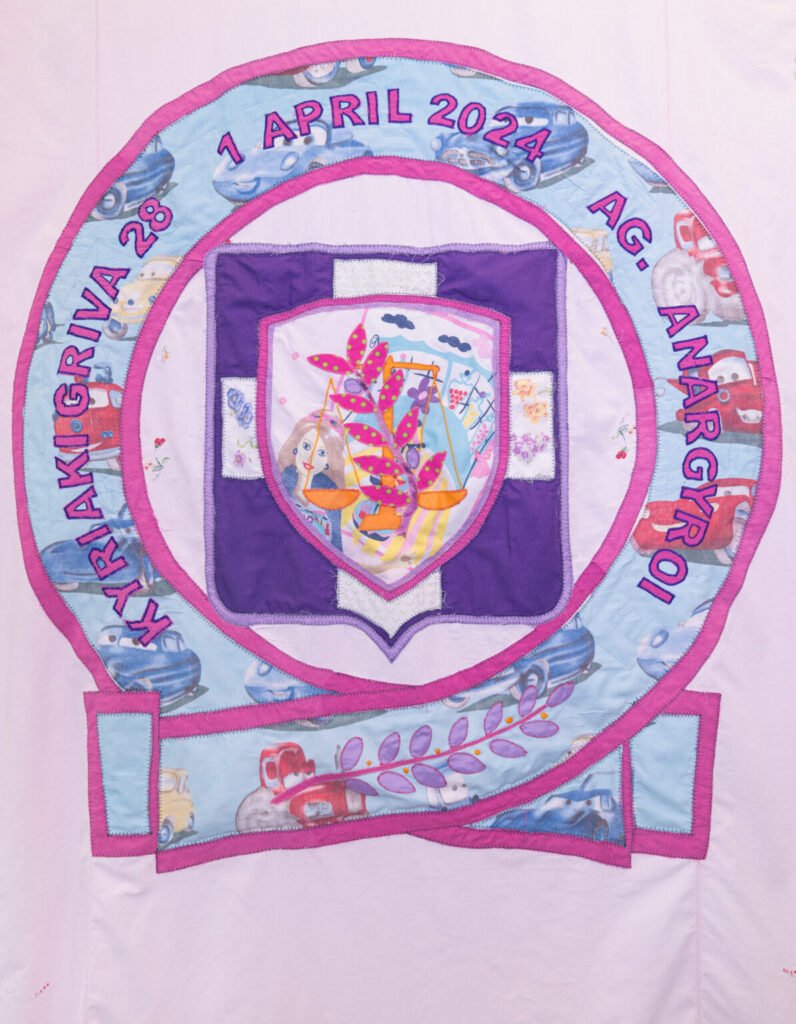
“Femicide” as a legal term
Femicides most commonly happen at the hands of individuals very close to the victim. Diotima Centre, a Greek non-profit specialising in gender equality issues, found that 58% of murders of women and femme people globally, occured at the hands of ex, or current partners. Despite these horrifying statistics, the Greek government still refuses to acknowledge femicide as a separate crime to murder, deeming that it is not a high-priority issue.
This not only leaves victims of femicide without justice, but contributes to the terrifying risk of not understanding the true scale of patriarchal influence and rape culture woven throughout our societal tapestry. Moreover, it prevents governmental and legal institutions from being educated on how they need to protect our women and femme siblings better.
“It’s very important for the term femicide to be recognised legally for the protection of women that experience domestic violence, for the justice of the women that have been murdered, for education and awareness,” Georgia explains.
Without naming femicide for what it is, we do not know how many women are murdered every day. This perpetuates the false notion that the personal is not political. If this language was already recognised legally, maybe we wouldn’t have lost so many of our sisters, our mothers, our friends. And maybe, just maybe, the same institutions that are meant to help us, could learn how to do their job.
These women constitute more than mere numbers. They are brutally robbed of their life, robbed of seeing their favourite faces, seeing the sun. If we had a clear idea of how many more daily femicides exist globally, I tremble at the thought of the number. Would it be 200? 1000? 10,000?
Art as collective resistance
Throughout our conversation, I kept being struck by the interactive approach that Georgia has embodied in their practice. “I strongly believe that art-making is a collective process,” they say. “It’s society that makes the art. I may be making the art physically, but the work is being created by society.”
“Flag” is a clear example of this. It is a piece inspired by the femicide of a woman named Caroline Crouch, a 20-year-old Greek student of British-Filipino descent, who was brutally murdered by her husband in her own home, in front of their daughter in 2021.
The artwork takes the shape of the national Greek flag, and is made up of donated bed sheets that Georgia collected from audience members during previous performances. It follows a predominant palette of pink, red and white, including fabrics with patterns of flowers and hearts, giving a real sense of familiarity and innocence. ”I made it in the sense that I put it together, but the piece was created that night when Caroline was murdered by her husband,” Georgia says.
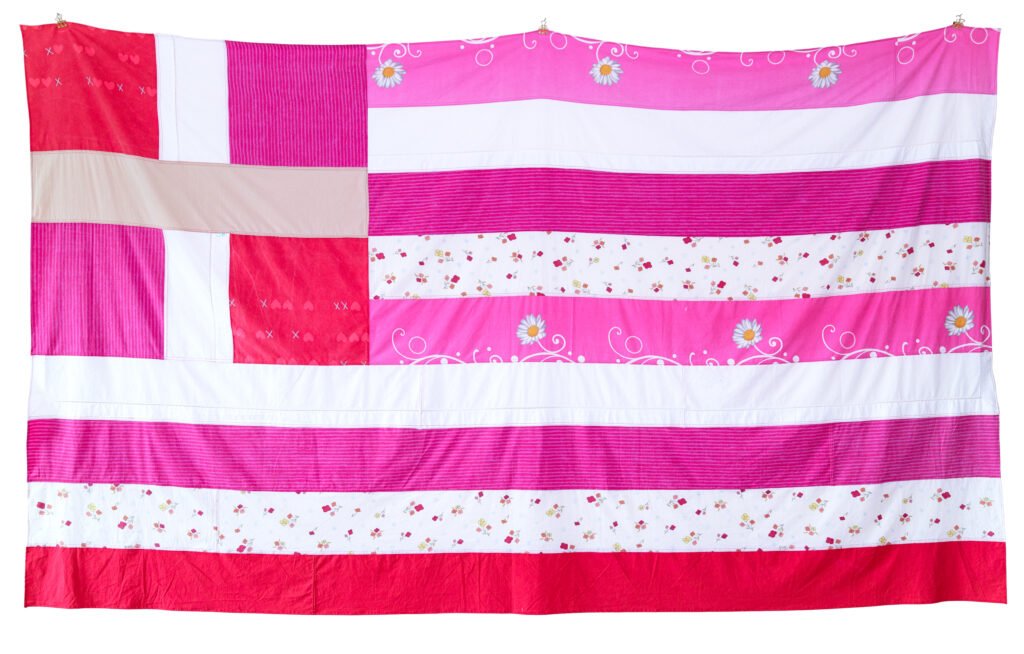
“Flag” was created as part of Georgia’s exhibition “Neighbourhood Guilt” in the Greek Consulate of New York. However, despite the exhibition being scheduled to last for two months, the work was forced to be taken down three days later.
The decision to take “Flag” down was made by the Greek Minister Of Foreign Affairs, George Gerapetritis. Many believe that this was because he wanted to appeal to a far-right member of the Greek Parliament, Dimitris Natsios, who held a printed photograph of the artwork, and stated that the piece was “a disgrace to the national symbol and that the only occasion in which it is accepted to be painted red is by the blood of the nation’s heroes.”
My entire body was filled with rage at the thought that these women were not considered as the nation’s heroes. That Greece’s government is more interested in pushing its outdated nationalist narratives than remembering the women who have been ripped away from us.
Georgia believes that the artwork’s removal has actually added power to the piece. “They may have taken ‘Flag’ down from the walls, but they put it up in the hearts of the Greek people.” In fact, it might have fostered even greater community. “By censoring my art, they made it available to a wider audience – and the people saw it and they liked it and it really spoke to them. There has been a whole community created by that piece,” Georgia adds.
Political censorship and art activism
Since the censorship of “Flag”, government officials have continued imposing their ideas and beliefs into censoring artistic and political works. One of the most recent incidents saw four pieces made by the artist Christoforos Katsadiotis, being vandalised in The Greek National Gallery by a (different) far-right member of the Greek Parliament, who believed they were “blasphemous.”
While human rights and climate activists become political prisoners for any governmental “disruption”, if you are a member of the parliament, you can act with impunity.
As our interview came to a close, I asked Georgia about the crucial role of art-making and archiving when commemorating, honouring and protecting our sisters and siblings.
“The more art is being made on the issue, the more people learn about it,” they say. “Femicide is a global phenomenon. As long as there’s patriarchy, femicides and gender-based violence will exist.”
“The more we talk about it, the wider the issue becomes and more and more people are being educated on the subject. Through art and archiving we are honouring those victims, those people’s memories, and we are not forgetting them.”
When governments and institutions fail to protect us, learning to protect each other is the most important tool in our resistance. Through collective art practices, we are able to come together, remember the sisters that we lost, resist our rights being taken away, and expose gender-based violence – in Greece and beyond. When we risk being erased, our art functions as a reminder that it’s impossible when we are all in this together.
What can you do?
Read:
- Men Who Hate Women by Laura Bates
- The Feminist Killjoy Handbook by Sara Ahmed
- Maya Pontone’s Hyperallergic Article on Georgia Lale’s artwork censorship
- “Why We Fight” Stories Initiative by Feminist Autonomous Centre For Research
- Migrant Women Press
Listen:
- Behind the Wall by Tracy Chapman
Watch:
- Felicia – Nel nome delle donne, by Nina Maria Pashalidou
- Mustang by Deniz Gamze Ergüven
Follow and support:
